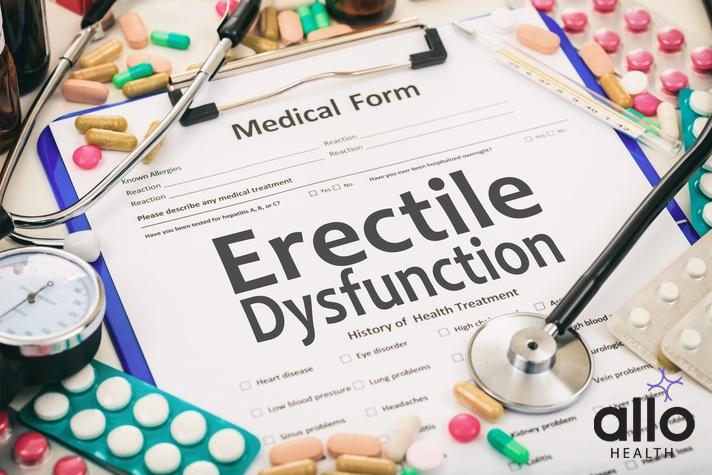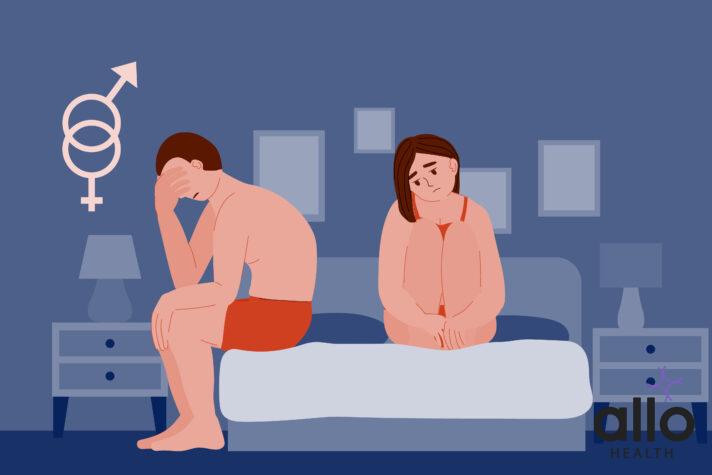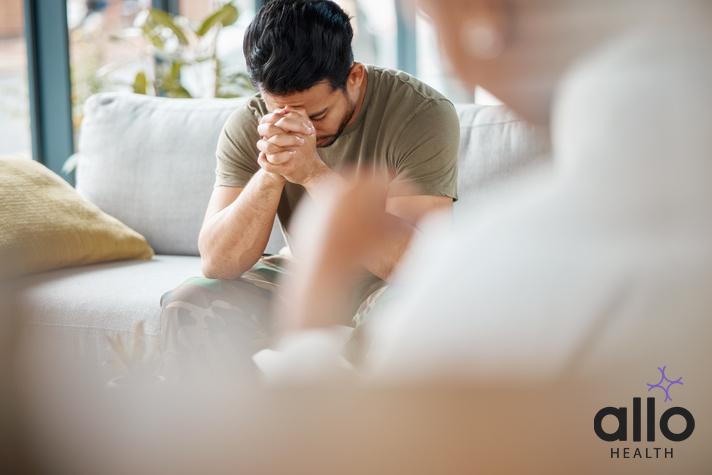Frosty Fixations: Ice Pack And Erectile Dysfunction

Allo Health is dedicated to personalized well-being, offering support and trusted information tailored to individual health goals. The platform emphasizes human-generated content, led by a distinguished medical team of experts, including physicians and sexual health specialists. Their commitment to credibility involves rigorous fact-checking, authoritative research, and continuous updates to ensure accurate, up-to-date information. Allo Health's unique approach goes beyond conventional platforms, providing expert-led insights and a continuous commitment to excellence, with user feedback playing a crucial role in shaping the platform's authoritative voice.

Dr. Raj. R holds an undergraduate medical degree from the Philippines, and has a bachelors background in Psychology. His experience working in the field of urology further brought his interest forward in working towards his passion of understanding the science of attraction, intimacy, sex and relationships. A key motto he practices by remains unprejudiced and non-judgemental care.
Why This Was Upated?
Our experts continually monitor the health and wellness space, and we update our articles when new information became available.
Updated on 09 April, 2024
- Article was updated as part of our commitment to diversity, equity, and inclusion.

"The following blog article provides general information and insights on various topics. However, it is important to note that the information presented is not intended as professional advice in any specific field or area. The content of this blog is for general educational and informational purposes only.
Book consultation
The content should not be interpreted as endorsement, recommendation, or guarantee of any product, service, or information mentioned. Readers are solely responsible for the decisions and actions they take based on the information provided in this blog. It is essential to exercise individual judgment, critical thinking, and personal responsibility when applying or implementing any information or suggestions discussed in the blog."
Erectile dysfunction is a condition characterized by the continuous incapability to achieve and keep up with the erection sufficiently for satisfied sexual intercourse. It is the outcome of diverse factors such as physiological issues like poor blood flow, hormonal imbalances, or neurological disorders, and also psychological factors such as stress, anxiety, or relationship problems.
Causes of Erectile Dysfunction
ED can be caused by a combination of several factors that involve, psychological factors, physical causes, and lifestyle factors that intensely affect sexual health. Common causes include:
- Psychological factors- Factors such as stress, anxiety, depression, and relationship issues are partly responsible for ED by affecting intimacy, sexual desire, arousal, painful erections, and stimulation.
- Physical Conditions- Conditions affecting the proper blood flow to the penis, such as atherosclerosis or high blood pressure, affects the proper blood circulation and also contributes to ED.
- Neurological issues- Certain disorders such as multiple sclerosis or Parkinson’s disease can influence the nerve signals involved in bringing off and maintaining a long-lasting erection.
- Hormonal imbalances- Sometimes low testosterone levels may lead to erectile concern, and can affect healthy penile erection or low-flow priapism.
- Certain Medications- Medications such as antidepressants anti hypertensives, and prostrate drugs, may give certain kinds of effects that also lead to ED sometimes.
- Lifestyle Factors- Smoking, excessive drinking, illegal drug abuse, and obesity might create a strong impact on one’s health and can also lead to ED by affecting blood circulation and overall well-being and also increase the risk for priapism.
- Medical Conditions- Underlying medical conditions such as diabetes, kidney problems, blood disease, narrowing of blood vessels, and Peyronie’s disease can give rise to ED or sometimes can cause permanent damage.
- Physical Injury or Surgery- Any kind of trauma to the genital area or pelvic region or surgery that affect the nerves or blood vessels, or may disrupt the normal blood flow in the region may cause ED thus resulting in sexual deprivations.
How Does an Ice Pack Help in Treating Erectile Dysfunction?
The treatment of this health condition may involve lifestyle changes, certain medications, therapies, or other inventions depending on the underlying cause of the individual. People experiencing ED must consult a healthcare expert for a proper diagnosis and a modified treatment plan.
- Using an ice pack to treat ED might seem to be strange at first, but it can be an effective temporary remedy for some men.
- Applying a cold pack to the penis constricts blood vessels, decreases the blood flow, and reduces inflammation in that area. This reduction can stimulate blood flow to the penis, resulting in an improved erection in some cases.
- Cold therapy, such as applying an ice pack, may help to reduce the swelling and redness and relieve the pain in some circumstances.
- It’s important to discuss with a healthcare provider who can provide you with proper evaluation and guidance on particular treatments based on the specific causes and health conditions.
Science Behind the Effectiveness of Ice Packs for ED
The science behind using an ice pack for ED is rooted in the concept of vasoconstriction the narrowing of the blood vessels. It is believed that applying cold to the penis temporarily reduces blood flow, which can help some men achieve firmer erections.
Benefits of Using an Ice Pack for ED Treatment

Ice pack is primarily beneficial for ED treatment and the potential to improve blood flow to the penis which helps in achieving a firm erection and results in satisfying sexual play. This remedy is quite affordable, non-invasive, and easily available in most households. Additionally, ice packs can help reduce inflammation and swelling, making it an ideal remedy for ED caused by physical injury or trauma.
Side Effects of Using an Ice Pack for ED Treatment
While using an ice pack For ED treatment is generally safe, there are some potential risks and side effects to consider.
- Applying cold to the penis for too long can cause damage to the penile tissue and frostbite.
- Some men may experience discomfort or pain during the treatment, especially if they have sensitive skin or a medical condition that affects blood flow.
- It is important to consider that using an ice pack for ED treatment is not a substitute for seeking medical treatment. While it may provide temporary relief, it does not address the underlying causes of ED.
- Men who experience continuous or severe ED should consult with a healthcare provider to ascertain the best course of treatment for their individual needs.
Ice Pack for Treating Erectile Dysfunction

It’s important to note that using an ice pack for ED treatment is not a substitute for medical advice or treatment. Additionally, using an ice pack for too long or too frequently can cause tissue damage and worsen the condition.
- No scientific backing- Using an icing pack for ED lacks scientific support and is not recommended for treatment of ED.
- Seek Professional Consultation- Seeking advice from a healthcare expert to identify and bring out the root causes of ED.
- Approved treatments- Focusing on treatments such as certain medications, lifestyle changes, or therapy for addressing ED.
- Avoiding Unverified methods- Experimenting with unfamiliar approaches may pose risks and could be ineffective. Always prioritize evidence-based methods.
- Healthy Lifestyle choices- Maintaining a healthy lifestyle with regular exercise, a wholesome diet, and plenty of sleep, as these factors may impact positively on sexual health.
- Honest Communication- Discuss concerns with your partner and health care provider to address the physical and emotional aspects of ED.
Home Remedies for Erectile Dysfunction
Home remedies include Kegel exercises, acupuncture, and herbal supplements like ginseng and saw palmetto. It’s essential to speak with your doctor before trying any home remedies, as some may interact with medication or worsen underlying medical conditions. Kegel exercises are a type of pelvic floor exercise that can help to improve erectile dysfunction. These exercises involve contracting and relaxing the muscles that control urination.
Another alternative treatment for erectile dysfunction is Acupuncture. This traditional Chinese medicine involves inserting thin needles into specific points on the body to stimulate energy flow.
Lifestyle Changes to Treat Erectile Dysfunction
Several factors can be taken into consideration out of which a few of those has been discussed:
- Regular exercise- Getting engaged in moderate to sharpened exercise to improve blood flow and maintain overall heart health, which is important for erectile function.
- Well-balanced diet- Maintaining a healthy diet rich in fruits, vegetables, whole grains, and lean proteins, and increasing overall well-being. supporting sexual health.
- Healthy body weight- Obesity is one of the risk factors for ED. Hence achieving and maintaining a healthy body weight through appropriate diet, physical activities, and exercise is extremely necessary.
- Limit Alcohol Consumption- Excessive alcohol intake can contribute to ED. Therefore, limiting alcohol intake or eliminating the same to promote sexual health.
- Quit Smoking- Smoking damages the blood cells and may lead to ED. Quitting smoking is a much essential step toward improving overall vascular health and blood conditions.
- Managing Stress- Chronic stress can cause damage to sensitive penile tissue or penile arteries. Practicing stress-reducing methods such as mindfulness, meditation or yoga might be beneficial for a healthy sexual activity.
- Plenty Of Sleep- Ensuring an adequate amount of quality sleep every night, as lack of sleep creates hormonal imbalances and the hormonal levels and leads to ED
- Communication- Maintaining healthy and open communication with your partner about sexual health, kinky foreplay, and sexual cuddle sessions is needed to create that sense of intimacy and bonding. And also, to seek expert’s help when needed.
Myths About Erectile Dysfunction and Ice Packs Debunked
There are several myths surrounding ED and using ice packs as a treatment. For example, some believe that ED only affects older men or that using an ice pack will permanently cure ED. Physical factors such as diabetes, high blood pressure, and hormonal imbalances also affect prolonged erections. However, ED can affect men of all ages and ice packs should not be used as a long-term solution to treat ED.
Expert Opinions On Using Ice Packs
Medical experts have varying opinions on using ice packs for ED treatment. Some believe that it is a safe and effective temporary remedy for some men, but for those who support the use of ice packs argue that the cold temperature can help to reduce inflammation and swelling in the genital area, which improves the blood flow and potentially alleviate symptoms of ED. However, others caution that applying ice directly to the skin can cause permanent tissue damage and may lead to permanent erectile dysfunction and might not be safe for all individuals.
Conclusion On Using an Ice Pack for ED
Using an ice pack for ED treatment can be an affordable and non-invasive remedy for some men. The science behind using an ice pack for ED is rooted in the concept of vasoconstriction – the narrowing of the blood vessels. However, making lifestyle changes and consulting with your doctor is crucial in preventing and treating ED effectively.
It’s important to note that using an ice pack for ED treatment may not be effective for all men. Therefore, it’s crucial to identify the root cause of ED before attempting any treatment, including using an ice pack. In conclusion, using an ice pack for ED treatment can be a useful and affordable option for some men, but it’s crucial to approach it with caution and under the guidance of a
Most Asked Questions
-
How does using an ice pack help with erectile dysfunction?
This question aims to clarify the mechanism or scientific basis behind using an ice pack for erectile dysfunction. Include information on any studies or evidence supporting this method
-
Are there any potential risks or side effects associated with using an ice pack for this purpose?
This question is crucial for addressing safety concerns. It should cover any potential risks, discomfort, or adverse effects that individuals might experience when using an ice pack for erectile dysfunction
-
What is the recommended duration and frequency of using an ice pack for erectile dysfunction?
Providing guidance on how often and for how long individuals should use an ice pack is essential for practical application. Include any specific instructions or recommendations from experts or medical professionals
-
Are there alternative treatments or therapies for erectile dysfunction that should be considered alongside using an ice pack?
This question encourages readers to explore a holistic approach to addressing erectile dysfunction. Mentioning alternative treatments allows for a more comprehensive understanding of available options
-
Can using an ice pack for erectile dysfunction replace traditional medical interventions or medications?
This question helps manage expectations and emphasizes the importance of consulting with healthcare professionals. It provides an opportunity to discuss whether using an ice pack can be a standalone solution or if it should be part of a broader treatment plan that may include traditional medical interventions






































